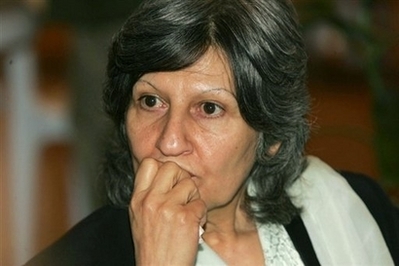Iraqi First Lady escapes Baghdad bombing
(Agencies)
Updated: 2008-05-05 08:37
Updated: 2008-05-05 08:37
BAGHDAD - Iraqi President Jalal Talabani's wife, Hero Ibrahim Ahmed, escaped a roadside bomb attack in the heart of Baghdad on Sunday that wounded her four bodyguards, officials said.
 Iraq's first lady Hero Ibrahim Ahmed, seen here in 2005, escaped a roadside bomb attack in the heart of Baghdad on Sunday that wounded her four bodyguards. [Agencies] |
The First Lady escaped unhurt as her convoy was hit by a roadside bomb while on her way to the National Theatre in central Baghdad's Karrada district where she was to attend a cultural programme, Talabani's office said in a statement.
Her four bodyguards were wounded, officials said, adding that it appeared to be an indiscriminate attack in the tightly-guarded capital.
Ahmed is a daughter of well-known political activist Ibrahim Ahmed who was one of the founders of the Kurdish Democratic Party, a leading political group in northern Iraq.
Born in 1948, she graduated from Baghdad University and joined the peshmerga forces with Talabani whom she married in 1970. She is now a businesswoman, owns a media group called Kakh, and is a children's rights activist.
Meanwhile, the US military said its troops killed 13 Shiite fighters in overnight clashes in Baghdad's Sadr City, the stronghold of anti-American cleric Moqtada al-Sadr.
The overnight clashes saw the military use tanks and air support in a series of exchanges with the militiamen in the district that is home to some two million Shiites.
The military also reported on Sunday the deaths of four US marines in a roadside bombing in western Iraq's Anbar province on Friday, marking one of the deadliest attacks in months against them in the former Sunni rebel bastion.
The latest Anbar attack brought to 1,290 the US military's losses in the province since the March 2003 invasion, according to independent website www.icasualties.org, closely trailing the 1,298 killed in the capital Baghdad.
Most of the US deaths in Anbar, the biggest province in Iraq, have been caused by roadside bombs. The losses in Anbar make up nearly a third of the 4,071 US troops killed in the conflict so far.
The vast desert province which borders Saudi Arabia, Syria and Jordan was a key stronghold of the anti-US insurgency in the first years after the overthrow of Saddam Hussein's regime.
Calm returned to the province, however, after local Sunni Arab tribal chiefs sided with the military in fighting Al-Qaeda militants since late 2006.
The violence in Sadr City came after the US military on Saturday destroyed what it said was a command and control centre operated by militants in the district.
Witnesses said a shack had been reduced to rubble and a nearby hospital suffered serious damage in the US strike that wounded 20 people.
The Iraqi government, meanwhile, said Sunday that it had no evidence to link Iranian support for militiamen leading attacks in Sadr City and called for better relations with Tehran.
On US accusations that weapons captured from Shiite fighters bore 2008 markings suggesting Iranian involvement, government spokesman Ali al-Dabbagh said: "We don't have that kind of evidence...
"If there is hard evidence we will defend the country."
The US military says it supports Iraqi moves to improve relations with its former enemy, although Washington has accused Iranian-backed groups of fuelling unrest.
It charges that these groups arm, fund and train Iraqi Shiite extremists to fight US forces. Tehran denies the charges.
In the main northern city of Mosul, an Iraqi woman freelance journalist was killed on Sunday, said police and the Journalists Freedom Observatory (JFO), a local media watchdog.
Gunmen dragged Tharwat Abdul-Wahab, 30, from a taxi and killed her in broad daylight, a local police officer told AFP.
Around 235 media staff have been killed in Iraq since the invasion, according to the JFO, making the country the most dangerous in the world from which to report.
Most of the Iraqi journalists killed have been targeted by insurgent groups or militia angered by their coverage or ideologically opposed to their employers. Others have died in crossfire.
|
||
|
||
|
|
|
|